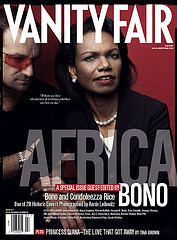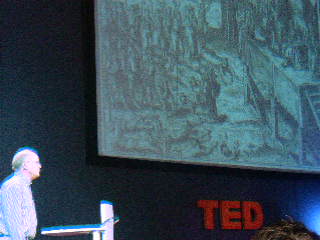From Crunk & Disorderly
In his talk, Bono had mentioned that he had persuaded Graydon Carter to have Vanity Fair do an issue highlighting Africa. Here’s one of the 20 different covers.
What’s inside? See the table of contents

From Crunk & Disorderly
In his talk, Bono had mentioned that he had persuaded Graydon Carter to have Vanity Fair do an issue highlighting Africa. Here’s one of the 20 different covers.
What’s inside? See the table of contents
Had a breakfast chat with the Member of Parliament for Laisamis (in Northern Kenya), Joseph Lekuton who’s here at TED to give a brief talk this morning and we discussed the constituency development fund in program in Kenya.
CDF was established in 2003 and is a program that directs 2.5% of the Kenya government revenue (from taxes) to be directly apportioned to the 210 constituencies depending on their population and other demographics. Local committees administer the fund and pick the programs which are to be financed e.g schools, dispensaries. The Laisamis CDF has disbursed its full allocation of about $600,000 for the year which he has committed to deliver services to his constituents who are largely nomadic.
More stories about the MP and Marsabit district, where Laisamis is located, which has a dedicated website.
I am newsless newswise (NN). TED has been great so far but I also want to know more about Tanzania on my first trip here (wandering around Lunga Lunga does not count)
One of the ways to appreciate what’s happening in a country (political, financial, investment, government, arts, developmentetc.) is to read as many local newspapers as possible – because while there are billions of things found online that a newspaper will not contain, there are also thousands of things in a daily newspaper that cannot be adequately captured online. However here at TED i have had a very hard time getting a newspaper to read.
I woke up on Day 1 (Monday morning) expecting to find newspapers available (free or tot buy) in the hotel lobby or gift shop. But I was told that daily newspapers would only arrive in the afternoon – which I found strange. And unlike in Nairobi or Kampala, there are no vendors milling around hotels selling newspapers. Have i found stumbled upon something here? Is the reading culture different from Uganda or Kenya and does that mean anything for the East African Community? Or is it just that guests at this premier hotel are usually not interested in the Tanzanian daily papers?
On Day 2 (Tuesday) I even got up at 5:30 a.m. and went in search of any shuttle driver (who transports delegates across town to conference) to buy and bring me a papers in the morning and I even left money at the reception.
So, after two days, I have got three newspapers. Day 1: Citizen, and Mtanzania (Swahili), that I that I bought at 1 PM from a vendor at the hotel. Day 2: the African that I believe was brought by a shuttle driver at about 12 PM. I have also had a change to read the Tuesday daily nation (Kenya) – a copy which belongs to the hotel.
I have become something of a newsless nuisance (NN) to the hotel staff who seem bemused at my desire to locate a newspaper in the morning (fresh with news for the day) – as if I am awaiting an important fedex package which I can’t trace.
It seems I may have to go to town myself to buy more papers like the business times, Arusha Times as well as other newspapers.
We’ll see what Day 3 brings….
Chatting with Hash at TED this morning about entrepreneurship and I got to talking about a book I had recently read. Before long, we agreed that it was a good story that would be worth repeating here this week. Kumeckucha [Blog] had posted on this a while ago)
A few weeks ago, I had read the autobiography of the late Mandatally Manji, an Asian-Kenyan who founded House of Manji which he built into the largest regional biscuit company.
He was encouraged by his family to put his life story together and it’s a fascinating story for any budding entrepreneur to read on. He details how;
It’s a great book that’s less than 200 pages long, but very hard to find.
More:
– Earlier post on Manji by Kumeckucha.
– Wikipedia entry
The book can found at Amazon (though pricey)

Dr. Ken Vickery of North Carolina State University gave a talk on past leaders in Africa and their engagement in entrepreneurial zeal and partnerships on their own terms to benefit their people.
So even as we stand at the dawn of a new era of partnerships of trade, development, debt, aid, etc., remember that history rhymes.